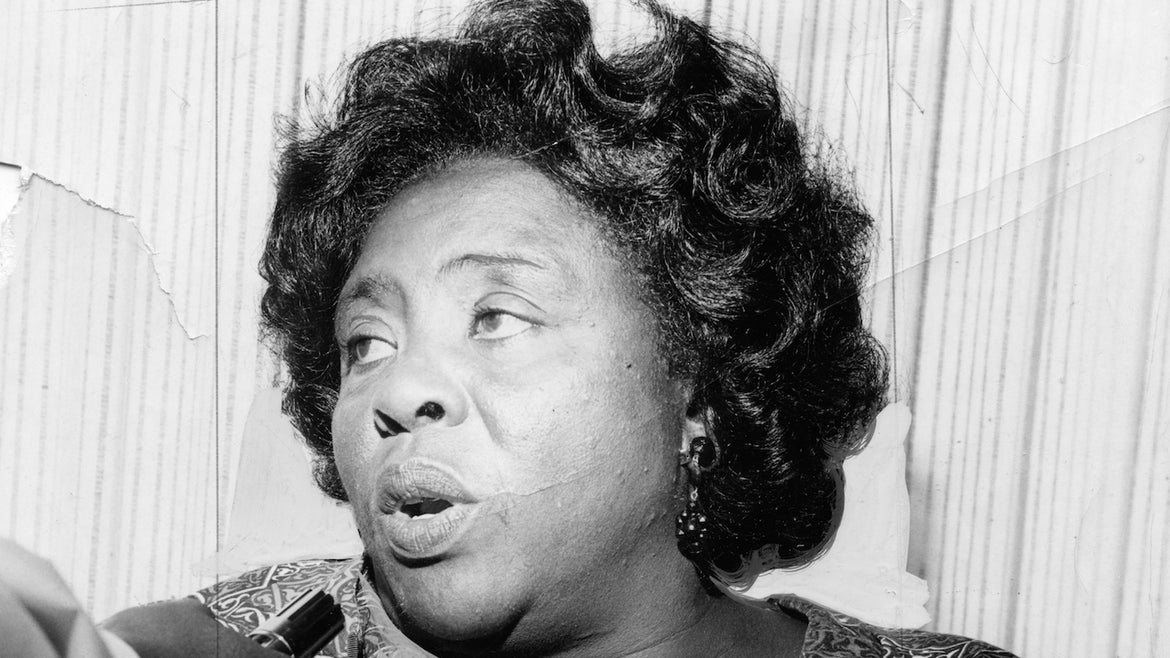Historian Kate Clifford Larson penned a recent biography about Hamer, titled "Walk With Me," to highlight how Hamer helped change the trajectory of the civil rights movement so that laws were passed and discrimination was outlawed.
Fannie Lou Hamer grew up in dire circumstances in Jim Crow-era and went on to become an inspiring civil rights leader in the 1960s. Historian Kate Clifford Larson penned a recent biography about Hamer, titled "Walk With Me."
She spoke with Inside Edition Digital to highlight how Hamer helped change the trajectory of the American civil rights movement so that laws were passed and discrimination was outlawed, something for which she will forever be remembered.
Hamer was born in Mississippi and was raised in an incredibly oppressive environment, Larson said. Even though she grew up in dire circumstances, she rose up and went on to become an inspiring civil rights leader.
"Fannie Lou Hamer struggled most of her childhood and young adulthood trying to survive in the cotton fields of Mississippi," Larson said. "She was tired of the poverty, and the hunger, and the discrimination. And when she became an adult, she started fighting for equal rights and eventually working with major civil rights organizations in Mississippi and in the country."
From there, she was able to have her voice heard, and those messages she had for her fellow Americans and politicians resonated.
Hamer saw that her community was in need and worked on many issues to improve people's lives.
"She was very concerned about food insecurity, and access to health care, education, preschool education, universal preschool education," Larson said. "She was fighting for those on the ground in Mississippi, and she was successful in moving those things forward."
Hamer also established a food co-op and a farm so people could farm their own food and fought for the desegregation of schools.
Even so, Larson pointed out, Hamer is not a household name.
"Martin Luther King and Rosa Parks often are the two icons of the civil rights movement that we teach students in school about, particularly young students. But there were many, many, many people involved in the movement that moved the trajectory of that process forward. And Fannie Lou Hamer was one of them," Larson said.
In the midst of fighting for civil rights, according to Women's History, Fannie was a victim of a "Mississippi appendectomy" when after going in for a uterine tumor, she received a hysterectomy without consent. This was a practice done regularly in the '60s by white doctors to reduce the Black population, experts said.
Even with all the hardship endured, Hamer continued to persevere. And Larson said her story is a reminder that people don't have to be born to the elite to be a leader.
"They don't all come from Harvard, Princeton, and Yale," she said of trailblazers and community pillars like Hamer. "They come from our communities, and they may not be well-educated. They may, in fact, be poor and come from vastly different backgrounds.
"But we need to recognize they have leadership skills and they have literacies beyond writing great essays and tones and, and things like that, that those literacies are learned and earned in the communities, in their homes, in their churches," she said. "And so we need to celebrate those leadership styles and recognize them and give them elevation where they need it."
Larson says that although Hamer's legacy was powerful and influential, there's still more work ahead.
"Fannie Lou Hamer was an amazing American woman and an American hero who fought against tremendous oppression and discrimination to bring civil rights, equality, justice, and self-determination to Americans," Larson said. "And we are benefiting from that to a day, and we still have to fight to fulfill the promise of what she was fighting for."






